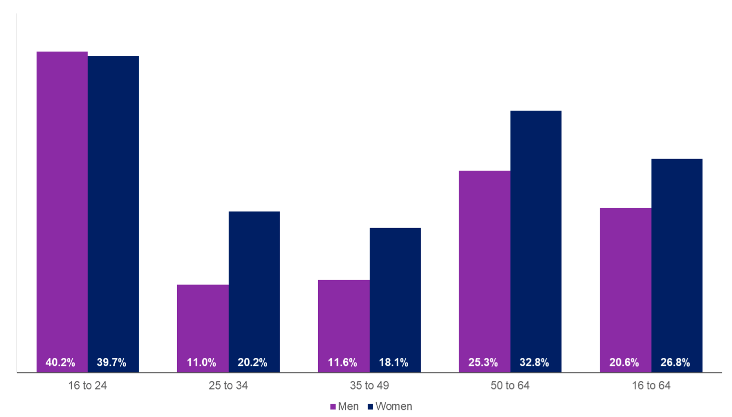Scotland's Labour Market: People, Places and Regions – Protected Characteristics. Statistics from the Annual Population Survey 2021
Summary publication of results from the ONS Annual Population Survey January to December 2021, presenting analysis on the labour market by protected characteristics including age, sex, disability and ethnicity.
Age and Sex
More information about estimates of 16 to 24 year olds is available in the About this publication section.
Employment
In 2021, the employment rate for men was higher than for women in all age groups, except those aged 16 to 24.
For both men and women, the employment rate was lowest for those aged 16 to 24. The highest employment rates for men and women were for those aged 25 to 34 and 35 to 49.

Source: Annual Population Survey, January to December 2021, ONS
Unemployment
In 2021, the unemployment rate for men was higher than for women in all age groups, except those aged 25 to 34. However, the estimates for 35 to 49 year old women and men and women aged 25 to 34 are based on small sample sizes. They may be less precise and users should be cautious when quoting them.
For both men and women, the unemployment rate was highest for those aged 16 to 24.

Source: Annual Population Survey, January to December 2021, ONS
Note: A shaded background indicates estimates are based on a small sample size. This may result in less precise estimates, which should be used with caution.
Economic Inactivity
In 2021, the inactivity rate for men was lower than for women in all age groups, except those aged 16 to 24.
For men and women, the inactivity rate was highest for those aged 16 to 24 followed by those aged 50 to 64.

Source: Annual Population Survey, January to December 2021, ONS
Not in Employment, Education or Training (NEET)
Estimates for women aged 16 to 24 who were not in employment, education or training (NEET) in 2020 and 2021 are based on small sample sizes and should be used with caution.
In 2021, 11.5 per cent of people aged 16 to 24 years were NEET. This is lower than a year ago (12.4 per cent) but is still higher than the proportion of 10.3 per cent in 2019 (pre-pandemic).
The proportion of 16 to 24 year olds who are NEET has typically been higher for women than men. However, the proportion of men aged 16 to 24 who are NEET has been higher than the proportion for women since 2019.

Source: Annual Population Survey, January to December datasets, ONS
Contact
Email: lmstats@gov.scot
There is a problem
Thanks for your feedback